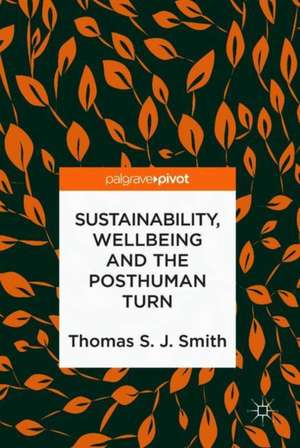Sustainability, Wellbeing and the Posthuman Turn
Autor Thomas S. J. Smithen Limba Engleză Hardback – 20 iul 2018
This book examines how the way we conceive of, or measure, the environment changes the way we interact with it. Thomas Smith posits that environmentalism and sustainable development have become increasingly post-political, characterised by abstraction, and quantification to an unprecedented extent. As such, the book argues that our ways of measuring both the environment, such as through sustainability metrics like footprints and Payments for Ecosystem Services, and society, through gross domestic product and wellbeing measures, play a constitutive and problematic role in how we conceive of ourselves in the world. Subsequently, as the quantified environmental approach drives a dualistic wedge between the human and non-human realms, in its final section the book puts forward recent developments in new materialism and feminist ethics of care as providing practical ways of re-founding sustainable development in a way that firmly acknowledges human-ecological relations. This book willbe an invaluable reference for scholars and students in the fields of human geography, political ecology, and environmental sociology.
Preț: 415.39 lei
Nou
Puncte Express: 623
Preț estimativ în valută:
79.49€ • 82.52$ • 66.29£
79.49€ • 82.52$ • 66.29£
Carte tipărită la comandă
Livrare economică 22 martie-05 aprilie
Preluare comenzi: 021 569.72.76
Specificații
ISBN-13: 9783319940779
ISBN-10: 3319940775
Pagini: 58
Ilustrații: VII, 93 p.
Dimensiuni: 148 x 210 mm
Greutate: 0.28 kg
Ediția:1st ed. 2019
Editura: Springer International Publishing
Colecția Palgrave Pivot
Locul publicării:Cham, Switzerland
ISBN-10: 3319940775
Pagini: 58
Ilustrații: VII, 93 p.
Dimensiuni: 148 x 210 mm
Greutate: 0.28 kg
Ediția:1st ed. 2019
Editura: Springer International Publishing
Colecția Palgrave Pivot
Locul publicării:Cham, Switzerland
Cuprins
Chapter 1 – The New Sustainable Development Agenda: An Introduction to Measurement and Conceptualisation.- Chapter 2 – The Abstraction of Nature and the Death of Environmental Politics: Our Calculable Earth.- Chapter 3 – Our Calculable Selves: The rise and hegemony of wellbeing discourse.- Chapter 4 – Ecological Ethics of Care and the Multiple Self: Revisiting the roots of environmentalism.
Notă biografică
Thomas S.J. Smith received his PhD from the University of St Andrews, Scotland. He is a post-doctoral researcher in the Department of Environmental Studies at Masaryk University, Czech Republic, and an editor at the Dark Mountain Project, an environmental literary initiative which gathers writers, poets, and artists who are interested in challenging the conventional narratives of civilisation.
Textul de pe ultima copertă
This book examines how the way we conceive of, or measure, the environment changes the way we interact with it. Thomas Smith posits that environmentalism and sustainable development have become increasingly post-political, characterised by abstraction, and quantification to an unprecedented extent. As such, the book argues that our ways of measuring both the environment, such as through sustainability metrics like footprints and Payments for Ecosystem Services, and society, through gross domestic product and wellbeing measures, play a constitutive and problematic role in how we conceive of ourselves in the world.
Subsequently, as the quantified environmental approach drives a dualistic wedge between the human and non-human realms, in its final section the book puts forward recent developments in new materialism and feminist ethics of care as providing practical ways of re-founding sustainable development in a way that firmly acknowledges human-ecological relations. This book will be an invaluable reference for scholars and students in the fields of human geography, political ecology, and environmental sociology.
Caracteristici
Explores two core terms in the study of sustainable development – wellbeing and sustainability Breaks from current technocratic understandings, and calls for an alternative vision of social development Affirms the need to rethink wellbeing and sustainability in the light of a recent turn towards New Materialism and posthumanism
